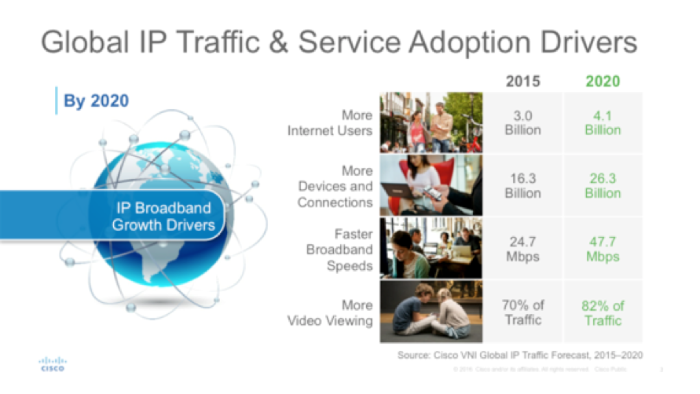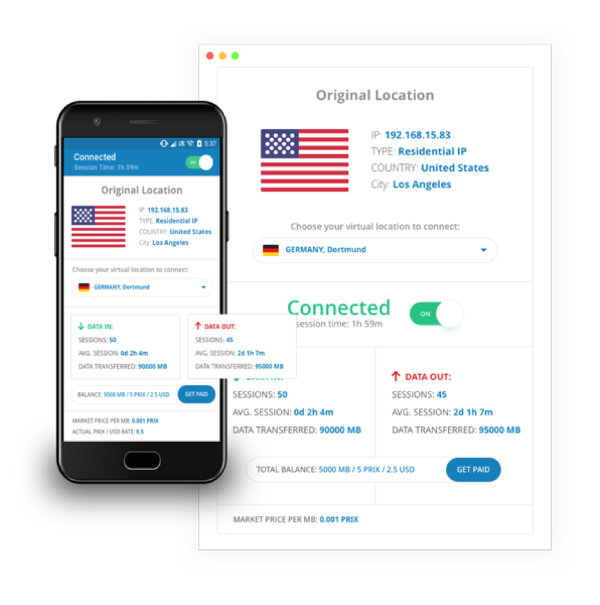Returning network neutrality: how to "fix" the Internet using the blockchain

The influence of the state, the actions of global corporations and the attacks of cybercriminals - the list of problems of the modern Internet is very extensive, and it may seem that the era of universal freedom and network neutrality is coming to an end. Whether this is so or with the help of the blockchain you can still fix everything - let's try to figure it out.
What is wrong with the modern Internet?
The number of Internet users in the world is constantly growing: in 2015 there were 3 billion, but, according to analysts, by 2020 this number will grow to more than 4 billion .

Data: Visual Networking Forecast , Cisco
However, with the growing popularity of the Internet, the associated problems, such as an increase in its control by various states and transnational corporations, the threat to user safety and the deterioration of infrastructure, are becoming more and more apparent.
Attempts to question the operation of the principle of network neutrality is one of the main threats to freedom on the Net. The development of the Internet is hampered by the constant attempts of states and corporations to monitor users, thus violating the human right to privacy and correspondence. Moreover, this problem is acute not only in countries like China or Iran, but also in completely democratic states, among which can be called the USA, Germany or Australia.
Cybercriminals are not asleep: according to the report of Cybersecurity Ventures, the damage from their actions amounted to $ 3 billion in 2015, and by 2021 this figure will increase to $ 6 billion a year . At the same time, modern security tools are often too complex for ordinary people to use effectively - for example, any “secure email client” is many times more complicated than simple mail.
Finally, the quality of the Internet infrastructure in different countries is not the same, as a result, the speed of its operation may suffer. This is facilitated by the fact that the content every year becomes "harder" (for example, HD-video).
It would seem that the tangle of problems is too serious for an unambiguous solution to exist, but not everything is so bad.
New Hope: Blockchain
The “blockchain” technology, or blockchain, has gained popularity due to the fact that it has built a Bitcoin electronic money system and its analogs. However, the blockchain's capabilities are not limited to cryptocurrencies, as evidenced by the explosive growth of projects based on this technology in various sectors - from finance to real estate sales.
It can also be used to “fix” the modern Internet with all its problems. Here is what you can do with the blockchain.
Fight against censorship
The blockchain technology makes it possible to approach Freedom as a Service (“freedom as a service”, FaaS), when the creators of IT projects provide users with services that are guaranteed not to be controlled by the states and special services. For example, the project team Privatix develops its own FaaS service, which is an SDK for developers of mobile applications and programs: it allows you to direct the traffic of these systems through encrypted communication channels of the blockchain-based communication platform.
As a result, developers will be able to guarantee their users that the products created on this SDK will not be possible to block in a particular country. A similar (but centralized) data transport system and SDK are provided by the AnchorFree project.
In addition, using the blockchain, you can even create a "parallel Internet" in which access to web pages will be maintained even after they are blocked.
This ideology is implemented by the developers of the Archain project. With the help of a special browser extension, users can save their favorite pages in the blockchain archive, which no special services or hackers can edit and delete something from it.
The system works on a new blockchain-like data structure called blockweave, which allows you to scale the archive to enormous size.
Communication protection
All over the world, VPN services are used as a tool to bypass blocking, which create encrypted connections and change the user's IP address (usually to the address of another country where access to the blocked site is allowed). One of the most famous such products is the Hola project.
Classic VPN providers use dedicated servers and standard protocols such as Openvpn, pptp, l2tp, sstp, etc. But centralized VPN has a drawback: you can block its work using DPI technology. In addition, such services use the addresses of certain data centers - they are easy to calculate and block.
In turn, a decentralized VPN based on blockchain technology allows you to switch between multiple input points — that is, computers of private users with private IP addresses (residential IP) —and use connections that cannot be detected using DPI. This is how VPN works on the basis of the already mentioned Privatix platform. The P2P network brings together tens of thousands of participants who can share their Internet channels and get paid for it using the built-in cryptocurrency - the PRIX token. Connecting to such a network is carried out using applications or routers with special firmware.

A similar project (centralized) - a service from the creators of Hola called Luminati.io . It allows you to use sites with residential IP addresses, runs on Hola VPN: people use it to bypass blocking, and the service sells their IP addresses to corporate customers. There are more than 24 million IP addresses in the system — it is not difficult for any state to block such a decentralized system, while “covering” the addresses of data centers of popular centralized VPN services is not a big deal.
Accelerate data loading
Content on the Web is becoming more “heavy”: the popularity of HD video, online games and streaming is growing. To speed up the loading, specialized content delivery systems (CDN) are used. Such systems consist of thousands of caching servers that deliver content to users on the best routes.
Despite the fact that the technology of centralized CDN works quite successfully, the factor of high prices for the services of its providers becomes more and more important. Their business is becoming more profitable: now the average prices for content delivery range from $ 0.05 to $ 0.3 per gigabyte. It is not surprising that, according to analysts, the volume of the CDN market by 2021 will exceed $ 23 billion (today its size is estimated at $ 6 billion).
Decentralized blockchain-based CDN services can reduce the price of content transfer by 5-10 times. In order to achieve this, the network must combine a large number of agent nodes. According to this scheme, the BlockCDN project is already working and the creators of the Privatix network are planning to work when it reaches the required size.
What is the result
Today, the free Internet is beneficial only to end users, and governments and corporations seek to limit it to solve their problems, whether it is blocking unwanted materials or analyzing private data to increase profits.
However, the blockchain technology allows to correct these problems and not only leave the Internet free, make it faster, but also create a new financial ecosystem based on its infrastructure.
For example, today blockchain-SDK allows you to create applications that can not be blocked, distributed VPN-services allow communication that can not be stopped even with the help of DPI, and Internet users can share their fast communication channels, not only allowing other people to download faster heavy content, but also earning on it - as in the case of the Privatix system.
All this is available today, and in the future, the potential of projects based on the blockchain will only grow.
All Articles